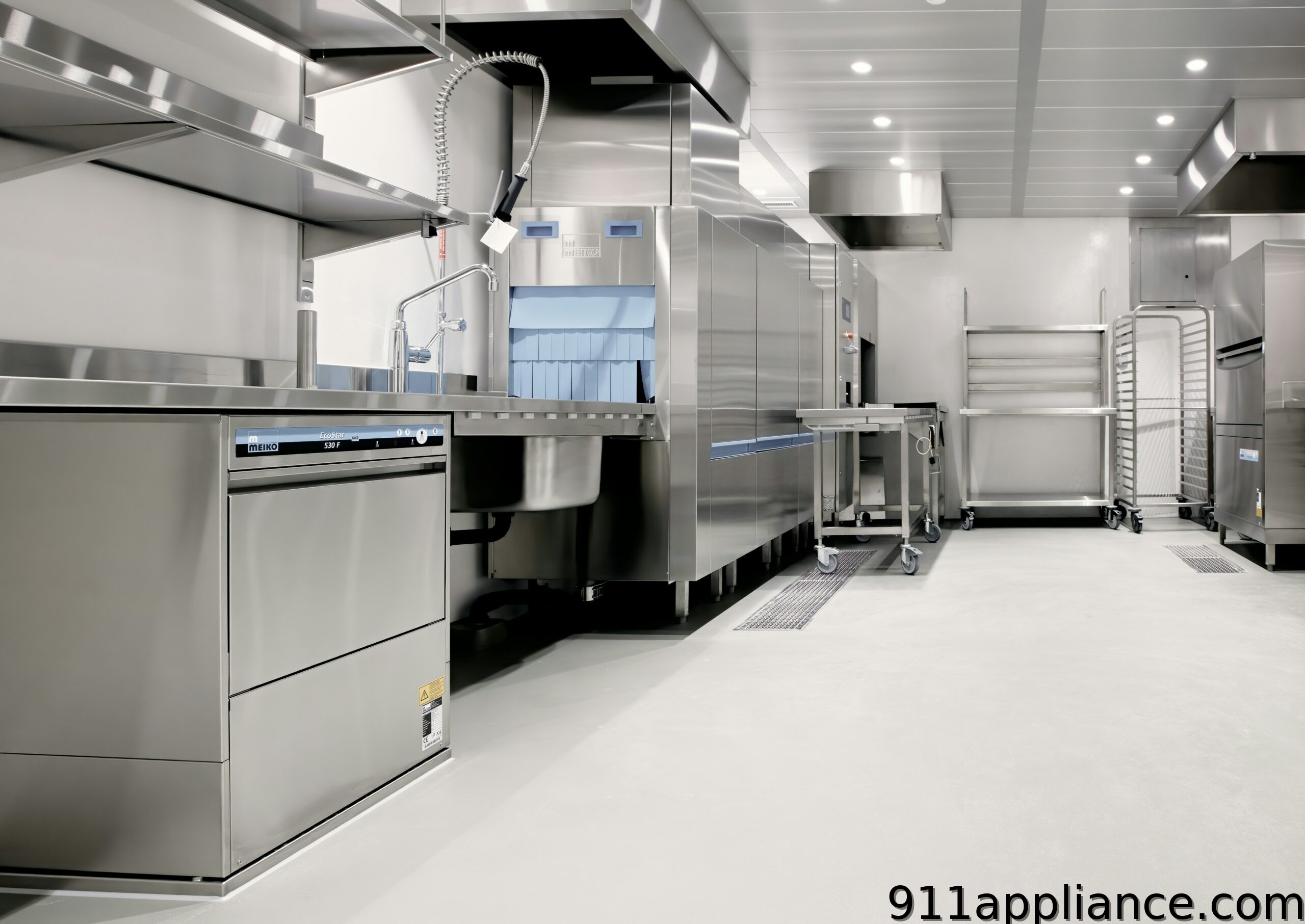Dishwashers are a convenient and time-saving appliance in any kitchen. However, like any other appliance, they can experience problems from time to time. It is important to address these issues promptly to ensure that your dishwasher continues to function effectively and efficiently. In this article, we will discuss some common dishwasher problems and provide tips for troubleshooting and resolving them.
Table of Contents
- Key Takeaways
- The dishwasher isn’t cleaning dishes properly
- The dishwasher is making strange noises
- The dishwasher is leaking water
- The dishwasher won’t start or turn on
- The dishwasher is leaving spots or film on dishes
- The dishwasher is emitting an unpleasant odor
- The dishwasher is not draining properly
- The dishwasher is not dispensing detergent or rinse aid
- The dishwasher is displaying error codes
- The dishwasher is not drying dishes effectively
- What Are Some Common Symptoms and Signs of Dishwasher Problems to Look for During Diagnosing?
- FAQs
- What are some common dishwasher problems?
- What are the symptoms of a dishwasher not cleaning dishes properly?
- What are the signs of a dishwasher not draining properly?
- What are some common causes of strange noises during dishwasher operation?
- What are some common causes of dishwasher leaks?
Key Takeaways
- Improper cleaning of dishes may be due to clogged spray arms or a malfunctioning pump.
- Strange noises may indicate a faulty motor or worn-out bearings.
- Leaking water can be caused by a damaged door seal or a cracked hose.
- Failure to start or turn on may be due to a faulty door latch or a blown fuse.
- Spots or film on dishes may be caused by hard water or insufficient detergent.
- Unpleasant odors can be eliminated by cleaning the dishwasher’s interior and running a vinegar cycle.
- Poor drainage may be due to a clogged filter or a malfunctioning drain pump.
- Failure to dispense detergent or rinse aid may be caused by a clogged dispenser or a faulty dispenser motor.
- Error codes can help diagnose specific issues with the dishwasher’s components.
- Ineffective drying may be due to a faulty heating element or a malfunctioning thermostat.
The dishwasher isn’t cleaning dishes properly
One of the most common problems people encounter with their dishwasher is poor cleaning performance. If you find that your dishes are not coming out clean after a cycle, there are a few potential causes to consider. First, check the spray arms to make sure they are not clogged with food particles or mineral deposits. Remove the spray arms and clean them thoroughly with a brush or toothpick.
Another possible cause of poor cleaning performance is a malfunctioning pump. The pump is responsible for circulating water throughout the dishwasher and spraying it onto the dishes. If the pump is not working properly, the dishes may not be getting enough water or detergent to be cleaned effectively. In this case, it may be necessary to replace the pump.
The dishwasher is making strange noises
If your dishwasher is making unusual noises during a cycle, it could be an indication of a problem. There are several potential causes for these noises, ranging from minor issues to more serious malfunctions. One common cause of strange noises is a loose spray arm. The spray arm is responsible for spraying water onto the dishes, and if it becomes loose or detached, it can create a rattling or banging sound. To fix this issue, simply tighten or reattach the spray arm.
Another possible cause of strange noises is a faulty motor. The motor is responsible for powering the various components of the dishwasher, such as the pump and spray arms. If the motor is malfunctioning, it may produce grinding or whining sounds during operation. In this case, it may be necessary to replace the motor.
The dishwasher is leaking water
A leaking dishwasher can be a frustrating problem to deal with. There are several potential sources of leaks, and it is important to identify and address the issue promptly to prevent further damage. One common cause of leaks is a damaged door gasket. The door gasket creates a seal between the dishwasher door and the tub, and if it becomes worn or damaged, water can leak out during a cycle. To fix this issue, simply replace the door gasket.
Another possible source of leaks is a cracked tub. The tub is the main compartment of the dishwasher where the dishes are placed, and if it develops a crack or hole, water can leak out during a cycle. Unfortunately, if the tub is cracked, it may be necessary to replace the entire dishwasher.
The dishwasher won’t start or turn on
If your dishwasher fails to start or turn on, there are a few potential reasons to consider. First, check the door latch to make sure it is functioning properly. If the door latch is not engaging properly, the dishwasher will not start. In this case, it may be necessary to replace the door latch.
Another possible reason for a dishwasher failing to start is a tripped circuit breaker. Check the circuit breaker panel to see if any breakers have been tripped. If so, reset the breaker and try starting the dishwasher again.
The dishwasher is leaving spots or film on dishes

If your dishwasher is leaving spots or film on your dishes after a cycle, there are a few potential causes to consider. One common cause is hard water. Hard water contains high levels of minerals, such as calcium and magnesium, which can leave behind residue on dishes. To prevent this issue, consider using a rinse aid in your dishwasher. Rinse aids help to prevent mineral deposits from forming on dishes and glassware.
Another possible cause of spots or film on dishes is a malfunctioning rinse aid dispenser. If the rinse aid dispenser is not working properly, it may not be distributing the rinse aid effectively. In this case, it may be necessary to replace the dispenser.
The dishwasher is emitting an unpleasant odor
If your dishwasher is emitting an unpleasant odor, it is likely due to a buildup of food particles and grease. Over time, these particles can accumulate in the dishwasher and create foul odors. To eliminate odors, start by cleaning the filter and spray arms. Remove any food particles or debris that may be trapped in these areas. You can also run a cycle with a cup of white vinegar to help remove odors.
To prevent odors from returning, make sure to scrape off excess food from dishes before placing them in the dishwasher. You can also run a cycle with a dishwasher cleaner once a month to keep your dishwasher smelling fresh.
The dishwasher is not draining properly
If your dishwasher is not draining properly, it can lead to water pooling in the bottom of the dishwasher. There are a few potential causes for this issue. One common cause is a clogged drain hose. The drain hose is responsible for carrying water out of the dishwasher and into the sink or garbage disposal. If the drain hose becomes clogged with food particles or debris, water may not be able to flow out of the dishwasher properly. To fix this issue, simply remove the drain hose and clean it thoroughly.
Another possible cause of poor drainage is a malfunctioning pump. The pump is responsible for pumping water out of the dishwasher and into the drain hose. If the pump is not working properly, water may not be able to flow out of the dishwasher effectively. In this case, it may be necessary to replace the pump.
The dishwasher is not dispensing detergent or rinse aid
If your dishwasher is not dispensing detergent or rinse aid properly, it can lead to poor cleaning performance and the buildup of residue on dishes. One possible cause of this issue is a faulty dispenser. The dispenser is responsible for releasing the detergent or rinse aid at the appropriate time during a cycle. If the dispenser is not working properly, it may not be distributing the detergent or rinse aid effectively. In this case, it may be necessary to replace the dispenser.
The dishwasher is displaying error codes
If your dishwasher is displaying error codes, it can be helpful in diagnosing and addressing any underlying issues. Error codes can indicate a range of problems, from a malfunctioning sensor to a damaged control board. To interpret error codes, refer to the dishwasher’s user manual or contact the manufacturer for assistance. Once you have identified the underlying problem, you can take steps to address it, such as replacing a faulty sensor or control board.
The dishwasher is not drying dishes effectively
If your dishwasher is not drying dishes effectively, it can be frustrating to have to dry them by hand after each cycle. There are a few potential causes for this issue. One common cause is a malfunctioning heating element. The heating element is responsible for heating the air inside the dishwasher during the drying cycle. If the heating element is not working properly, dishes may not dry effectively. In this case, it may be necessary to replace the heating element.
Another possible cause of poor drying performance is a clogged vent. The vent allows moisture to escape from the dishwasher during the drying cycle. If the vent becomes clogged with debris, moisture may not be able to escape properly, leading to damp dishes. To fix this issue, simply clean out any debris that may be blocking the vent.
In conclusion, addressing dishwasher problems promptly is essential to ensure that your dishwasher continues to function effectively and efficiently. By troubleshooting and resolving issues such as poor cleaning performance, strange noises, leaks, failure to start, spots or film on dishes, unpleasant odors, poor drainage, dispenser issues, error codes, and poor drying performance, you can keep your dishwasher running smoothly for years to come. Don’t hesitate to tackle any issues you may be experiencing with your dishwasher and enjoy the convenience it brings to your kitchen.
If you’re experiencing issues with your dishwasher, it’s important to understand the symptoms and signs of common problems. However, sometimes it’s best to leave the repairs to the professionals. That’s where 911 Appliance Repair comes in. With their extensive service area and expertise, they can help diagnose and fix any dishwasher problem you may be facing. In fact, they have a whole blog dedicated to appliance repair tips and tricks. Check out their article on “The Importance of Regular Dishwasher Maintenance” for more information on how to keep your dishwasher running smoothly.
What Are Some Common Symptoms and Signs of Dishwasher Problems to Look for During Diagnosing?
When conducting systematic dishwasher diagnosing steps, keep an eye out for common symptoms like strange noises, leaks, and dishes not being cleaned properly. Look for signs such as standing water at the bottom of the dishwasher or a strong, unpleasant smell. Identifying these issues early can save you time and money. Additionally, it’s important to familiarize yourself with common washer issues explained, as these problems can often affect dishwashers as well. Regular maintenance and inspection of your appliance can help prevent these issues from escalating into more serious repairs. By staying proactive, you can ensure that your dishwasher remains in optimal condition for years to come.
FAQs
What are some common dishwasher problems?
Some common dishwasher problems include dishes not getting clean, water not draining properly, strange noises during operation, and leaks. To effectively address these issues, it’s helpful to understand the root causes behind them. For instance, inadequate cleaning may result from overcrowding or malfunctioning spray arms, while leaks can stem from worn door seals or faulty hoses. For a deeper dive into these issues, refer to the guide on dishwasher common problems explained. Additionally, addressing minor issues with some diy dishwasher troubleshooting tips can save both time and money. Regular maintenance, such as cleaning filters and inspecting the spray arms, can also prevent many common problems before they start. By staying proactive, you can extend the lifespan of your appliance and ensure it operates at peak efficiency.
What are the symptoms of a dishwasher not cleaning dishes properly?
Symptoms of a dishwasher not cleaning dishes properly include food particles remaining on dishes, cloudy or spotty dishes, and a foul odor coming from the dishwasher.
What are the signs of a dishwasher not draining properly?
Signs of a dishwasher not draining properly include standing water in the bottom of the dishwasher, water not draining completely, and a foul odor coming from the dishwasher.
What are some common causes of strange noises during dishwasher operation?
Common causes of strange noises during dishwasher operation include a clogged or damaged spray arm, a malfunctioning pump, or loose or worn parts.
What are some common causes of dishwasher leaks?
Common causes of dishwasher leaks include a damaged door seal, a clogged or damaged drain hose, or a malfunctioning water inlet valve.



